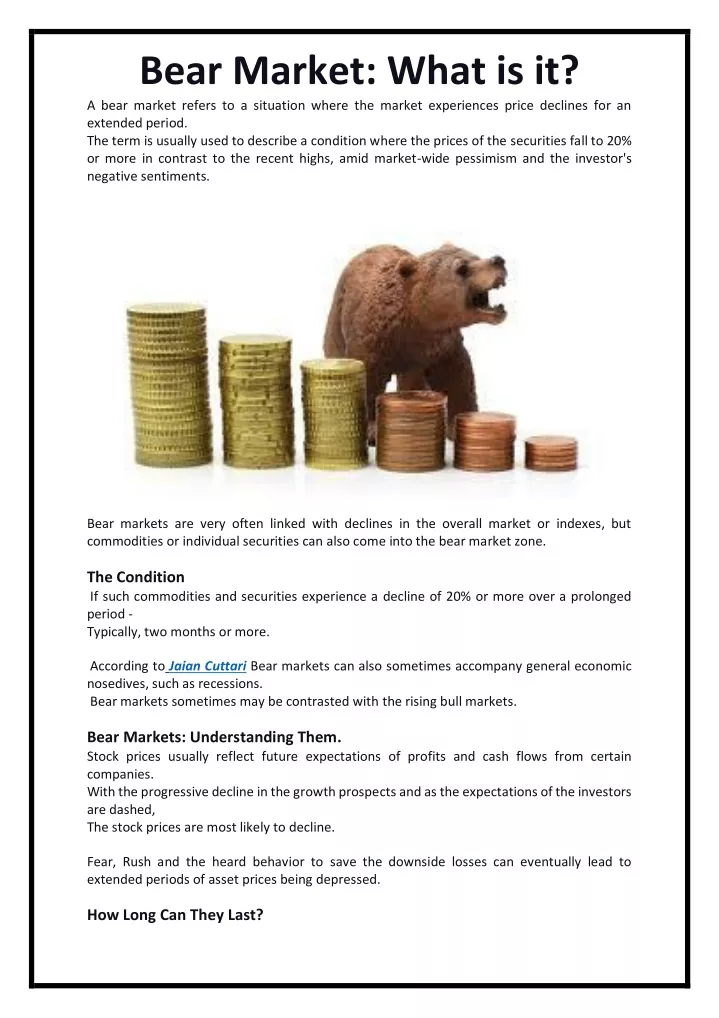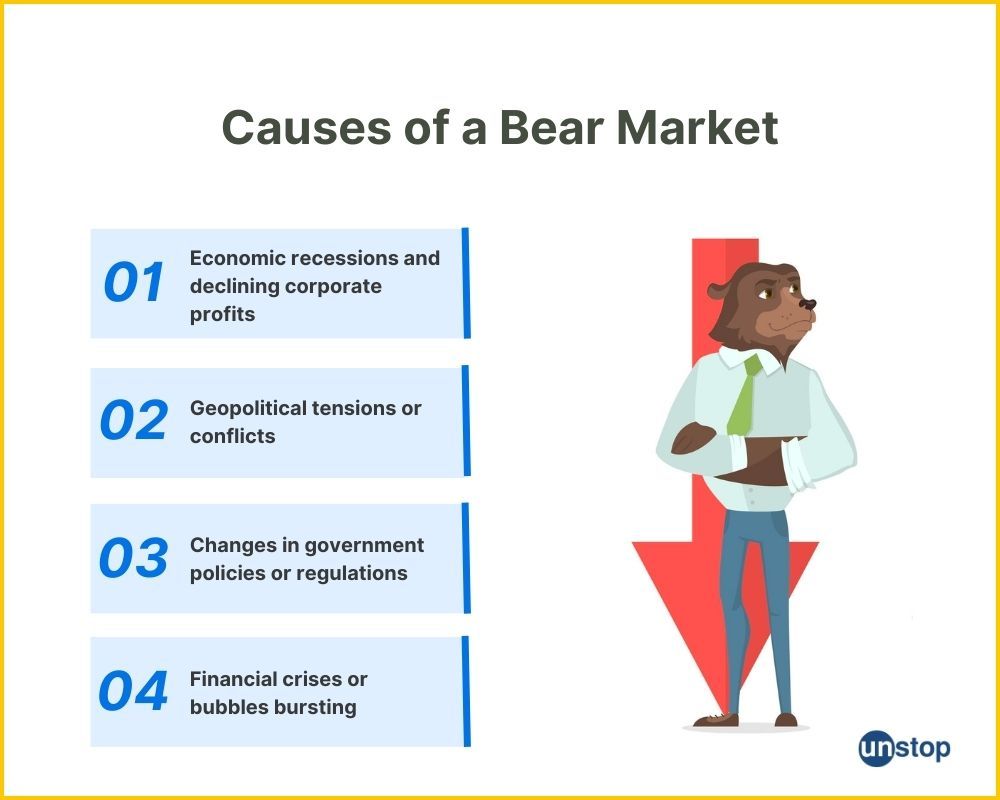Spectacular Tips About Who Benefits From A Bear Market

Navigating the Downturn
1. Decoding the Bear
So, the market's taking a tumble, huh? Everyone's running around like chickens with their heads cut off, yelling about bear markets. But before you join the panic, let's pump the brakes. A bear market, characterized by a significant and sustained decline in stock prices, can actually be a fertile ground for opportunity. It's not always a financial apocalypse. Think of it as a temporary sale on stocks, a chance to snag some bargains. The key question is: Who benefits from a bear market? And believe it or not, the answer isn't just the ultra-rich hedge fund managers (though, they probably do okay too).
It's essential to understand that market cycles are as natural as the changing seasons. What goes up must come down, and vice versa. A bear market is often a correction, a recalibration after a period of exuberant growth. It's when the excesses are purged, and valuations become more realistic. In other words, it cleans house!
The emotional element is massive. When markets are roaring, everyone feels like a genius. When they're tanking, the fear is palpable. But that fear is precisely what creates the opportunities for those who are prepared, disciplined, and maybe just a little bit contrarian. So, buckle up, buttercup, because we're about to dive into who these savvy individuals and entities are.
And hey, a little perspective is always good. Remember that time you bought those shoes on clearance? Same principle applies here. Except, you know, with potentially much larger financial implications.

Bull Market Vs Bear Key Differences 101 Blockchains
The Smart Shoppers
2. Buying Low, Selling High
This is probably the most straightforward answer. Long-term investors who have done their homework and identified solid companies with sound fundamentals see a bear market as a gift. It's a chance to accumulate more shares of these companies at significantly lower prices. They're not swayed by short-term market fluctuations; they're focused on the long game. Think Warren Buffett, patiently waiting for opportunities to pounce. He practically lives for bear markets.
The beauty of this strategy is its simplicity. If you believe in the long-term prospects of a company, a temporary price drop is just noise. It's like finding your favorite brand of coffee on sale. You stock up, right? Same idea. The important thing is to have a diversified portfolio and not put all your eggs in one discounted basket. Diversification is your shield against the market's unpredictable moods.
Dollar-cost averaging is another powerful tool for long-term investors during bear markets. This involves investing a fixed amount of money at regular intervals, regardless of the stock price. When prices are low, you buy more shares; when prices are high, you buy fewer. Over time, this can smooth out your average cost per share and potentially lead to better returns. Plus, it takes the emotion out of the equation — you're not trying to time the market, you're just consistently investing.
Think of it as planting seeds. You don't expect to harvest the crop the next day, right? Investing is the same way. You sow the seeds during the lean times (bear markets), nurture them over time, and then reap the rewards when the market inevitably recovers. Patience is paramount!

Bear Market Homecare24
The Financial First Responders
3. Profiting from the Plunge
Okay, this group is a bit more controversial. Short sellers and put option holders are essentially betting that a stock's price will decline. Short selling involves borrowing shares of a stock and selling them, with the expectation that the price will fall. If the price does fall, the short seller can buy the shares back at a lower price, return them to the lender, and pocket the difference. Put options give the holder the right, but not the obligation, to sell a stock at a specific price by a certain date. If the stock price falls below that price, the put option becomes profitable.
These strategies can be highly profitable during bear markets, but they're also extremely risky. If the stock price goes up instead of down, short sellers and put option holders can lose a lot of money — potentially even more than their initial investment. It's a high-stakes game that requires a deep understanding of market dynamics and risk management.
Short sellers are often portrayed as villains, profiting from other people's misery. But they also play an important role in the market by identifying overvalued companies and bringing them back down to earth. They act as a check and balance, preventing bubbles from inflating too much. It's a love-hate relationship, really. Like that annoying but ultimately helpful friend.
Imagine you're a detective investigating a company suspected of fraud. Short selling is like placing a bet that your investigation will uncover the truth and cause the stock price to plummet. If you're right, you profit; if you're wrong, you pay the price. It's not for the faint of heart!

Coping Strategies For Investors During Bear Markets Logics Valley
The Rebalancers
4. Stay the Course
Those who already have a well-diversified portfolio benefit from rebalancing during a bear market. Rebalancing means selling some of your investments that have performed well and buying more of those that have performed poorly. This helps to maintain your desired asset allocation and reduces your overall risk. During a bear market, your stock holdings are likely to have declined in value, while your bond holdings may have held up better. Rebalancing would involve selling some of your bonds and buying more stocks, taking advantage of the lower stock prices.
Think of it like tending a garden. If one type of plant starts to dominate, you need to trim it back and give the other plants room to grow. Rebalancing is the same thing — you're ensuring that no single asset class becomes too dominant in your portfolio.
Rebalancing can also be a psychological advantage. It forces you to buy low and sell high, even when your emotions are telling you to do the opposite. It's a disciplined approach that helps you stay the course during turbulent times. It's about maintaining your long-term strategy, not reacting to short-term market noise.
Plus, regular rebalancing can actually increase your long-term returns. By buying more of the assets that have underperformed, you're positioning yourself to benefit from their eventual recovery. It's like buying low and selling high, but on autopilot.

Benefits Of A Bear Market Christian Financial Advisors®
The Cash-Rich Opportunists
5. Dry Powder Ready
Companies or individuals sitting on a pile of cash are in a prime position to benefit from a bear market. They can use their cash to acquire distressed assets at bargain prices. This could include buying undervalued companies, real estate, or other investments that have been beaten down by the market downturn. It's like being the only one with an umbrella during a downpour — you can pick up all the stranded bargains.
This strategy requires patience and a keen eye for value. You need to be able to identify assets that are fundamentally sound but have been unfairly punished by the market. It's like finding a diamond in the rough — it takes some digging, but the reward can be significant.
Private equity firms and venture capitalists often thrive during bear markets. They have access to large pools of capital and the expertise to identify and acquire distressed companies. They can then turn these companies around, improve their operations, and eventually sell them for a profit. It's like being a turnaround artist, breathing new life into struggling businesses.
So, if you happen to have a spare million or two lying around, a bear market might be your chance to become a financial titan. Just kidding (mostly). But the principle remains the same: cash is king during a downturn, and those who have it are in a position to capitalize on the opportunities.

What Is A Bear Market Explained With Investing Tips // Unstop
The Innovators
6. Building the Future
Bear markets can be a catalyst for innovation. When times are tough, companies are forced to become more efficient, creative, and customer-focused. They need to find new ways to cut costs, improve their products and services, and attract customers. This can lead to breakthroughs in technology, business models, and marketing strategies.
Think of it as a pressure cooker. When the heat is on, innovation is often the result. Companies that are able to adapt and innovate during a bear market are more likely to emerge stronger and more competitive when the market recovers.
Startups with disruptive technologies or business models can also thrive during bear markets. They may be able to attract talent and capital that are fleeing from more established companies. They can also gain market share by offering innovative solutions that address the changing needs of customers. It's like being a nimble speedboat in a sea of slow-moving tankers.
So, while a bear market can be painful for many companies, it can also be a time of opportunity for those who are willing to embrace change and innovate. It's about finding new ways to solve problems and create value in a challenging environment. Sometimes, the best ideas are born out of necessity.